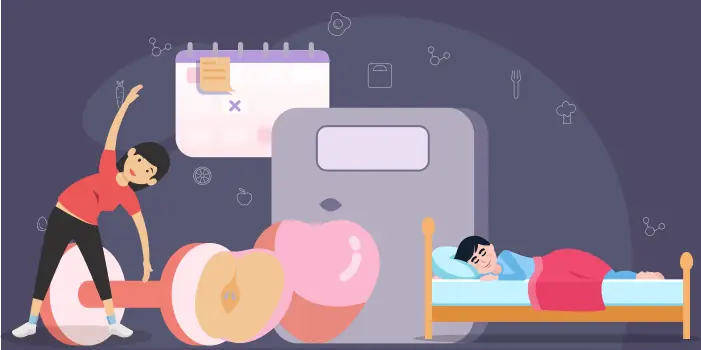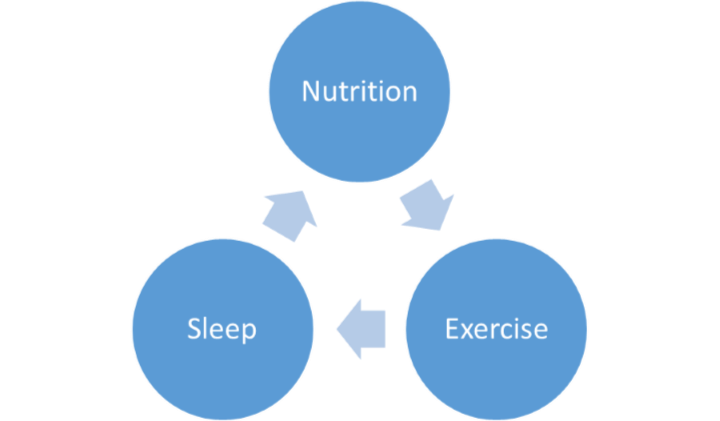Sleep, Diet, and Exercise: The Health Triad
January 22, 2023

Sleep, Diet, and Exercise: The Health Triad
The interconnected features at the foundation of wellness
Three lifestyle factors form the pillars of good health: diet, exercise, and sleep.
Each is so important to the others, and to overall health, that experts have dubbed sleep, diet, and exercise the “wellness triad.”
When our nutritional, movement, and sleep needs are fully met, our energy levels, mood, cognitive performance, and immune function can operate at full capacity.
And when one pillar of the health triad pillars is compromised, the balance that supports mental and physical well-being is thrown off.
Insufficient sleep, for instance, disrupts energy and appetite, which has a ripple effect on fitness and diet.
And insufficient exercise inhibits deep sleep, which is associated with overconsumption of low-nutrient foods.
Maintaining healthy behaviors, such as sleep tracking, diet plans, and exercise routines, requires motivation and commitment. Understanding the health triad, and how it functions as a feedback loop, underscores the importance of each to our day-to-day wellbeing.

Sleeping for a Healthy Diet:
Across many experiments and studies, research has demonstrated a clear
bidirectional relationship between sleep and diet.
In both the short- and long-term,
good sleep leads to better food choices, and good nutrition promotes better sleep.
That close relationship is made especially clear when either our sleep or eating is out of balance.
After a night of insufficient sleep, you're more likely to reach for a coffee as your energy levels fade... plus a donut to go with it. When you are tired, research shows that you're less likely to consume fiber or protein, and more likely to choose salty, sweet, and starchy foods to brighten your mood, settle your stomach, and boost your energy. That adds up to fewer nutrients and more empty calories.
Without enough sleep, you're also more hungry overall- by as much as 23-24%
according to some studies. Studies have found, people who did not get enough sleep consumed an average of 600 additional calories the following day.
That's because
good quality sleep is important to the balance of hormones that regulate appetite.
Specifically, lost sleep reduces leptin (the body's 'satiety hormone') and creates higher levels of ghrelin (the 'appetite hormone'). A sleepy person tends to eat more calories than their body requires because they feel an increase in appetite and less sense of satisfaction after a meal.
Along with nutrition and portions,
sleep loss throws off your eating patterns
as well. Regular eating patterns help stabilize blood sugar and metabolism, supporting a healthy weight and energy levels. People who don't get enough sleep are less likely to eat breakfast, and are more likely to snack frequently and skip meals.
In multiple studies, a long-term lack of sufficient rest has been associated with obesity and increased abdominal fat,
both of which are considered risk factors for cardiovascular disease.
Eating for Sleep:
Getting enough restorative sleep is clearly essential for making healthy food choices.
And as it turns out, healthy eating habits can also improve sleep.
When it comes to eating for rest, experts agree that following a heart-healthy diet is more important than seeking out any particular nutrient.
In particular,
sleep scientists recommend eating a varied diet
, with plenty of fiber, produce, and protein, and avoiding saturated fats. Several studies have shown that women following the Mediterranean Diet , which emphasizes unsaturated fats and lean protein, report better sleep health.
Exercising for Sleep:
It goes without saying that tiring yourself out with a vigorous workout is a great way to prime your body for a good night’s sleep. But you don’t need to wear yourself out before bed in order to sleep better.
Studies show that even
moderate exercise
affects the body and brain in ways that benefit sleep health.
Newer research has also shown that this
relationship between exercise and sleep
is also bidirectional. That is, better sleep can lead to improvements in fitness, just as more exercise promotes good sleep.
According to one report in the Journal of Sleep Medicine, subjects who completed moderate workouts every other day for 6 weeks logged an extra 75 minutes of sleep per night.
According to the authors, that’s an even bigger increase in rest than that produced by sleep-inducing drugs!
Exercise improves sleep in several ways. Physical activity increases levels of adenosine in the brain, a hormone responsible for regulating fatigue. While caffeine produces alertness by inhibiting adenosine, exercise actually increases its concentration in the brain, creating a feeling of sleepiness.
Exercise also raises the body’s core temperature, which triggers the release of heat through the extremities. Our bodies naturally start cooling slightly about two hours before bedtime, beginning the release of sleep-inducing melatonin.
Just like a hot shower before bed, a moderate workout can kick off the body’s cooling response and the associated wave of calming melatonin.
Along with the acute effects of exercise on sleep health, there are also well-established long-term benefits. According to the
National Sleep Foundation
, regularly engaging in moderate exercise has been shown to significantly reduce average sleep latency, or the time it takes to fall asleep, and to improve sleep quality. Regular exercisers spend more time per night in the deepest, most restorative phase of rest, known as slow-wave sleep. Exercise also improves emotional well-being, reducing feelings of anxiety, stress, and depression that can lead to sleep disturbance.
Sleeping for Fitness:
As much as exercise benefits sleep health, adequate sleep is equally important to physical fitness.
Our bodies
release growth hormone during slow-wave sleep
, which drives muscle tissue recovery and growth.
In other words, by logging more deep sleep, you’ll give your muscles more growth time, and see more fitness gains from your regular exercise routine. Those benefits persist outside of the gym and the bedroom as well; adults who sleep the recommended 7-9 hours per night have been shown to have higher resting metabolic rates.
Most importantly for exercise, good sleep is energizing. While your muscle strength and fitness capacity don’t physically decline after a night of insomnia, your sense of fatigue will limit your ability to exert yourself. In experiments,
people who have been sleep deprived show significantly
lower endurance on treadmill exercises
the next morning. And in the long run, people who get adequate sleep are
more successful in sticking to their exercise routines
than those who sleep too little, according to research from the Journal of Clinical Sleep Medicine.
Along with workouts, our incidental exercise matters. Anyone who has tracked their daily steps knows that most of our daily movement comes from routine activities, such as climbing the stairs to work. But when we feel exhausted from poor sleep, we are more likely to wait for the elevator, conserving energy while missing out on daily incidental exercise. Over time, limiting incidental movement because of fatigue can have a serious impact on overall fitness.
Prioritizing Sleep, Diet, and Exercise
In a fast-paced world, it’s tough to prioritize healthy eating, working out, and
sleeping 7-9 hours per night
as experts recommend.
But understanding the health triad as a three-way feedback loop can shift our relationship to these core physical needs.
Improving in even one of these core areas can greatly benefit your performance in the others, as well as your overall health. A program that supports sustainable goals, such as sleep coaching, fitness class, or eating plan, can create seismic changes in your mood, productivity, and even longevity.